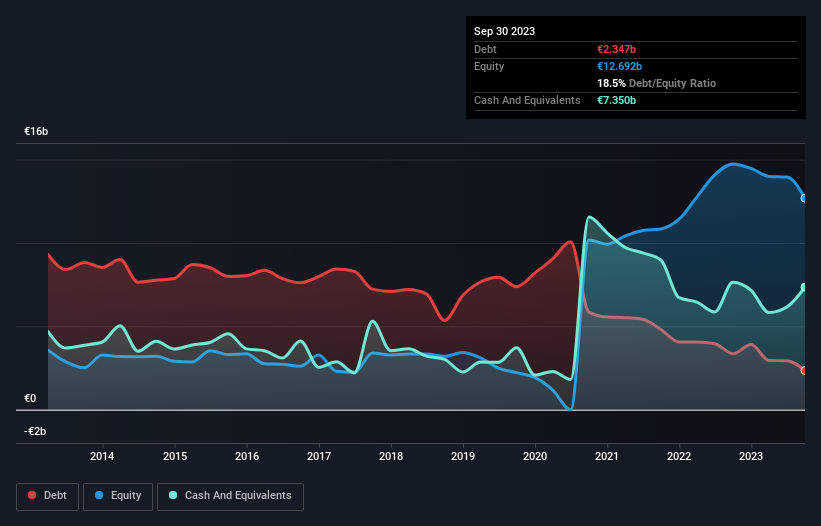David Iben put it well when he said, 'Volatility is not a risk we care about. What we care about is avoiding the permanent loss of capital.' So it might be obvious that you need to consider debt, when you think about how risky any given stock is, because too much debt can sink a company. As with many other companies thyssenkrupp AG (ETR:TKA) makes use of debt. But the real question is whether this debt is making the company risky.
What Risk Does Debt Bring?
Debt and other liabilities become risky for a business when it cannot easily fulfill those obligations, either with free cash flow or by raising capital at an attractive price. If things get really bad, the lenders can take control of the business. However, a more common (but still painful) scenario is that it has to raise new equity capital at a low price, thus permanently diluting shareholders. Of course, plenty of companies use debt to fund growth, without any negative consequences. When we think about a company's use of debt, we first look at cash and debt together.
Check out our latest analysis for thyssenkrupp
What Is thyssenkrupp's Debt?
As you can see below, thyssenkrupp had €2.35b of debt at September 2023, down from €3.35b a year prior. But it also has €7.35b in cash to offset that, meaning it has €5.00b net cash.

A Look At thyssenkrupp's Liabilities
According to the last reported balance sheet, thyssenkrupp had liabilities of €13.1b due within 12 months, and liabilities of €7.48b due beyond 12 months. Offsetting this, it had €7.35b in cash and €6.69b in receivables that were due within 12 months. So its liabilities total €6.56b more than the combination of its cash and short-term receivables.
The deficiency here weighs heavily on the €3.85b company itself, as if a child were struggling under the weight of an enormous back-pack full of books, his sports gear, and a trumpet. So we definitely think shareholders need to watch this one closely. At the end of the day, thyssenkrupp would probably need a major re-capitalization if its creditors were to demand repayment. thyssenkrupp boasts net cash, so it's fair to say it does not have a heavy debt load, even if it does have very significant liabilities, in total. When analysing debt levels, the balance sheet is the obvious place to start. But ultimately the future profitability of the business will decide if thyssenkrupp can strengthen its balance sheet over time. So if you're focused on the future you can check out this free report showing analyst profit forecasts.
In the last year thyssenkrupp had a loss before interest and tax, and actually shrunk its revenue by 8.8%, to €38b. We would much prefer see growth.
So How Risky Is thyssenkrupp?
While thyssenkrupp lost money on an earnings before interest and tax (EBIT) level, it actually generated positive free cash flow €307m. So taking that on face value, and considering the net cash situation, we don't think that the stock is too risky in the near term. Given the lack of transparency around future revenue (and cashflow), we're nervous about this one, until it makes its first big sales. To us, it is a high risk play. There's no doubt that we learn most about debt from the balance sheet. But ultimately, every company can contain risks that exist outside of the balance sheet. These risks can be hard to spot. Every company has them, and we've spotted 1 warning sign for thyssenkrupp you should know about.
At the end of the day, it's often better to focus on companies that are free from net debt. You can access our special list of such companies (all with a track record of profit growth). It's free.
The New Payments ETF Is Live on NASDAQ:
Money is moving to real-time rails, and a newly listed ETF now gives investors direct exposure. Fast settlement. Institutional custody. Simple access.
Explore how this launch could reshape portfolios
Sponsored ContentNew: Manage All Your Stock Portfolios in One Place
We've created the ultimate portfolio companion for stock investors, and it's free.
• Connect an unlimited number of Portfolios and see your total in one currency
• Be alerted to new Warning Signs or Risks via email or mobile
• Track the Fair Value of your stocks
Have feedback on this article? Concerned about the content? Get in touch with us directly. Alternatively, email editorial-team (at) simplywallst.com.
This article by Simply Wall St is general in nature. We provide commentary based on historical data and analyst forecasts only using an unbiased methodology and our articles are not intended to be financial advice. It does not constitute a recommendation to buy or sell any stock, and does not take account of your objectives, or your financial situation. We aim to bring you long-term focused analysis driven by fundamental data. Note that our analysis may not factor in the latest price-sensitive company announcements or qualitative material. Simply Wall St has no position in any stocks mentioned.
About XTRA:TKA
thyssenkrupp
Provides industrial and technology solutions and services in Germany and internationally.
Flawless balance sheet and undervalued.
Similar Companies
Market Insights
Weekly Picks


A case for CA$31.80 (undiluted), aka 8,616% upside from CA$0.37 (an 86 bagger!).


Moderation and Stabilisation: HOLD: Fair Price based on a 4-year Cycle is $12.08

Early mover in a fast growing industry. Likely to experience share price volatility as they scale
Recently Updated Narratives


A case for USD $14.81 per share based on book value. Be warned, this is a micro-cap dependent on a single mine.

Occidental Petroleum to Become Fairly Priced at $68.29 According to Future Projections

Agfa-Gevaert is a digital and materials turnaround opportunity, with growth potential in ZIRFON, but carrying legacy risks.
Popular Narratives


MicroVision will explode future revenue by 380.37% with a vision towards success


Crazy Undervalued 42 Baggers Silver Play (Active & Running Mine)






